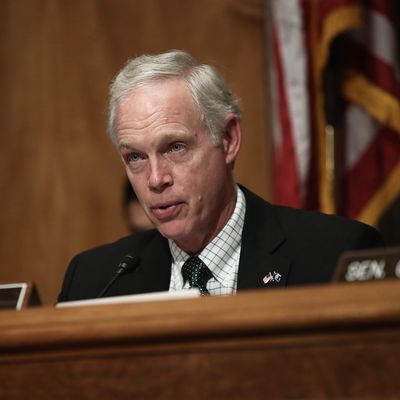
The origin of the Republican-led Senate Homeland Security Committee’s investigation of Joe Biden was a conspiracy theory that began in Russia. It held that, when Biden was serving as vice-president, he pressured Ukraine to fire its prosecutor general, Viktor Shokin, in order to prevent a prosecution of a company, Burisma, that employed Biden’s son Hunter. In his infamous 2019 phone call with Ukrainian president Volodymyr Zelensky, Trump outlined the theory: “There’s a lot of talk about Biden’s son — that Biden stopped the prosecution, and a lot of people want to find out about that. So whatever you can do with the attorney general would be great. Biden went around bragging that he stopped the prosecution, so if you can look into it.”
Today, Wisconsin senator Ron Johnson’s committee released the product of its investigation. It has not, in fact, proved this hypothesis or even produced any new evidence for it. Indeed, the report concedes that “the extent to which Hunter Biden’s role on Burisma’s board affected U.S. policy toward Ukraine is not clear.” The unsupported insinuation it began with remains an unsupported insinuation.
There’s no doubt that Burisma had sought to influence Biden by paying Hunter off with a suspiciously generous position and that Hunter actively participated. It is also true that some members of the Obama administration knew about Hunter’s position and considered it awkward.
However, there is no evidence that this attempted payoff did influence Biden — and a tremendous amount of evidence that it did not. NBC News recently reported that former State Department official Amos Hochstein was prepared to testify to Johnson’s committee that “he never changed U.S. policy because of Burisma,” that he “was never asked to do so,” that “Burisma never factored into any policy decisions around energy or Biden’s advocacy for a new Ukrainian prosecutor general,” and that he contemporaneously told other officials that the administration “sought to punish Burisma rather than protect it.”
All the available evidence supports the conclusion that Joe Biden wanted to fire Shokin not to protect Burisma but because Shokin was corrupt. That is why Western allies, democracy advocates, and every organization not invested in perpetrating Ukrainian corruption had the same position as Biden did on this matter. Johnson himself signed a letter in 2016 supporting Biden’s position. It would have been evidence of corruption if Biden had wanted to protect Shokin; he was trying to clean Shokin out because everybody knew Shokin was dirty.
Johnson has claimed his report found a “massive conflict of interest” that demonstrates Biden’s “unfitness for office.” But while it does not tarnish the record of Joe Biden, whose actions toward Ukraine were beyond reproach, it certainly proves that Hunter Biden is unfit for office. Hunter Biden collected payments from an interested party that stood to benefit from friendly U.S. policy. Hunter Biden has no business serving as president of the United States. On this, both parties can surely agree.
But since Hunter Biden is not on the ballot and Donald Trump is, Johnson’s reasoning has implications for the electorate that he seems not to have considered.
Robert Mueller did not obtain Trump’s financial information, so he did not undertake any extensive examination of the president’s financial conflicts of interest. But even Mueller’s tightly conscripted criminal investigation uncovered serious financial entanglements. Trump was secretly pursuing a licensing deal with Russia during the 2016 campaign that stood to give him hundreds of millions of dollars in profit at zero risk, according to the Mueller report. Trump has spent years collecting money from shadowy, Russian-linked figures. Andrew Weissmann, one of Mueller’s top deputies, writes in his new book that the account Trump used to funnel hush money to Stormy Daniels received “payments linked to a Russian oligarch.” And Rudy Giuliani, the lawyer representing Trump’s interests in the region for “free,” was in fact both seeking payments for himself from Ukraine’s government and getting paid by clients who were on the payroll of an oligarch linked to Vladimir Putin.
These are extremely serious conflicts of interest, probably worse than anything Hunter Biden has done. The other financial conflicts Trump may be concealing remain unknown to the public because he has smashed precedent by refusing to disclose his financial interests. This may help explain Trump’s long series of oddly pro-Russian actions and statements, most recently his series of refusals to say anything about Russia’s poisoning of Alexei Navalny or even to admit that Russia had done it.
Johnson and his entire party have refused to do anything to hold the president accountable to the rock-bottom standard of letting the American people know who is paying their president. Instead they have sought to obscure Trump’s culpability by enveloping the matter in a haze of parallel countercharges so that confused voters have to sift through identical-sounding allegations against both candidates, making it all the easier for them to throw up their hands helplessly.
But the facts of this case are pretty simple. Hunter Biden collected money from corrupt foreign interests but was unable to deliver any results to his benefactors. Trump definitely sought to collect money, probably received it, and definitely delivered results. Joe Biden collected nothing and delivered nothing.
Hunter Biden’s financial interests have been investigated. Donald Trump’s have not. If voters want a non-corrupt president, they should vote for neither man.






























